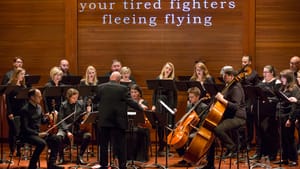Stay in the Loop
BSR publishes on a weekly schedule, with an email newsletter every Wednesday and Thursday morning. There’s no paywall, and subscribing is always free.
So proudly we hail
The Crossing presents 'the national anthems tour'

Some groups celebrate Veterans Day with a parade or flag ceremony. To open its 2017-18 season, Philadelphia’s elegant choral ensemble the Crossing gave a stirring concert called the national anthems tour.
After performances in Princeton and at the National Gallery of Art in Washington, DC, Donald Nally and his impeccable ensemble alighted at the Presbyterian Church of Chestnut Hill. For these concerts, five string players from the International Contemporary Ensemble (ICE) joined the choir.
The program opened with Ted Hearn’s “Consent,” a 2014 work with words culled from many sources: letters, Catholic and Jewish marriage rites, and text messages from the 2013 Steubenville rape trial. A shifting, unsettling a cappella piece, it opens with sibilant whispers. Choral entrances are staggered in minute intervals to create texture as well as sound, and spoken words combine with a rising cacophony ending with the plaintive question, “Who gives this woman?”
The evening also included Hearn’s “What It Might Say,” a short work with words from a scientific paper about infant-mother communication. It was set in the style of a poem by e e cummings, and in spite of its clinical text, the piece was traditional in feeling, with lovely close harmony.
"Yearning to breathe free"
The first half highlight was To The Hands, a major 2016 work by Caroline Shaw. Its six sections reflect the structure of Dietrich Buxtehude’s 1680 cantata cycle Membra Jesu Nostri. For one movement, the composer drew text from Emma Lazarus’s poem on the Statue of Liberty, setting “yearning to breathe free” to imply a struggle for breath itself.
Another movement – inspired by the Song of Solomon – was a filigree of high violin strings with the psalm’s words “in caverna” hovering above like a mantra. In the fifth section, the choir read numbers of displaced persons above the sliding strings, data providing “the cruelest and most honest poetry.”

Shaw opens and closes her work with musical quotes from Buxtehude’s Ad manus: the first movement a plainchant orison and the last a tender cross between a berceuse and a march that concludes with a single plucked string, like a heartbeat. A gifted singer herself, Shaw intimately understands the voice, and like many of her works, To The Hands is an organic, sonorous, deeply moving juxtaposition of old and new.
Text-heavy, meaning-filled
On the program’s second half was one major work, the national anthems by David Lang. Having recorded his works, the Crossing has an affinity for this celebrated composer. He created the piece by looking at every national anthem he could find, pulling out phrases that seemed the “most committed” to identify common aspirations. What he found were constant references to war, tragedy, and blood, but rather than write an aggressive piece, Lang sculpted the words into a memory work of international longing.
The single lines plucked from anthems, potentially just disjointed words and phrases, are united by repetition into this five-movement whole. The first section presents each line in a hymnlike way, with air between the phrases that allows time to absorb the words. This thoughtful treatment gives way to a relentlessly longing march brimming with love of the land.
The second movement, filled with lush harmony, features the men singing the text in an ostinato ornamented by the women. The third movement evokes the seductive power of nationalism, leading to a fourth section where the soprano rises out of the chorus like a priest leading a litany. In its striking final movement, all 48 lines begin with the word, “our.” Though each phrase is a description of a different land or longing, that one word stresses commonality. the national anthems ends with the words “may the rains come,” a heartfelt plea seeking grace for all.
As always, the Crossing sang impeccably, with great commitment and dramatic impact. The company has a distinctive sound and vocal gifts that can border on pyrotechnics, here used in service of the works, not to outstrip or outshine the music or its meaning. The company previously commissioned two of the pieces on this program, and all four were written within the last three years.
In this text-heavy concert, with words from many sources that overlapped for sonic and emotional effect, Nally made the welcome decision to use supertitles. The conductor often connects his programs thematically to make an artistic statement through programming, and this was no exception.
A thoughtful consideration of what it means to be a person and a citizen, this concert was especially appropriate for a season filled with remembrances of many nations and cultures. WRTI recorded the program for future broadcast.
What, When, Where
the national anthems tour. the national anthems by David Lang; Consent and What It Might Say (from Jeff Quartets) by Ted Hearne; To The Hands (from Seven Responses) by Caroline Shaw. Donald Nally, conductor, with strings of the International Contemporary Ensemble (ICE). November 13, 2017 at the Presbyterian Church of Chestnut Hill, 8855 Germantown Avenue, Philadelphia. crossingchoir.com
Sign up for our newsletter
All of the week's new articles, all in one place. Sign up for the free weekly BSR newsletters, and don't miss a conversation.

 Gail Obenreder
Gail Obenreder